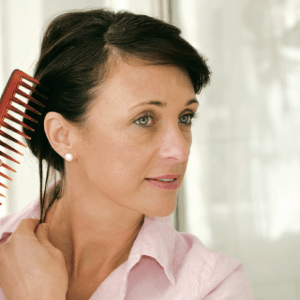What You Need to Know About Female Hair Loss

If you have wondered whether your shedding or thinning hair amounts to actual hair loss, you’re certainly not alone.
“I often get asked how a woman knows they are experiencing hair loss,” says Dr. Mary Wendel, the medical director of Medi Tresse, a local medical practice specializing in the treatment of female hair loss. “As a hair loss specialist, there are specific signs we look for and tell women to look for, such as excessive shedding, a widening part, a thinner ponytail, or a receding hairline. However, while hair loss may seem fairly objective—either you have it or you don’t—in reality, that is not how people feel about hair loss when they are experiencing it, especially women.”
The truth is that everybody has different perceptions about what counts as hair loss and unfortunately, society has placed a lot of negative connotations on female hair loss. This causes many women to delay seeking the great treatment options available. According to Dr. Wendel, it is important to break through the negative connotations of words and phrases such as “hair loss,” “thinning hair,” or “alopecia” so that it is easier to admit that we are experiencing hair loss and should see a hair loss specialist.
Female hair loss is more common than you think, but the causes and treatment plans can vary greatly. Most types of female hair loss are also progressive, which means they will continue to get worse without treatment. “If you are seeing more hair in the shower drain or noticing a widening part, do not wait,” Dr. Wendel says. “Millions of women are seeing hair loss specialists every year—and you should too.”
3 Tips for Treating Hair Loss in Women
- Met with a female hair loss specialist. Female hair loss can be very complex, and it’s important to be treated by a specialist who can determine the best treatment plan for your specific loss.
- Receive a diagnosis. There are many causes of female hair loss and not all treatments are appropriate for each type of hair loss.
- Stick with the treatment plan. While we all want immediate results, it can sometimes take six to 12 months to see the full benefit. Don’t stop treatment too early.
Dr. Mary Wendel founded Medi Tresse, a medical practice specializing in the treatment of female hair loss, in 2015. Medi Tresse has seen more than 2,500 women at their Wellesley and Worcester locations.
This is a paid partnership between Medi Tresse and Boston Magazine


